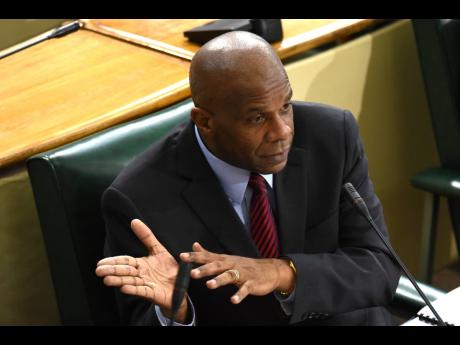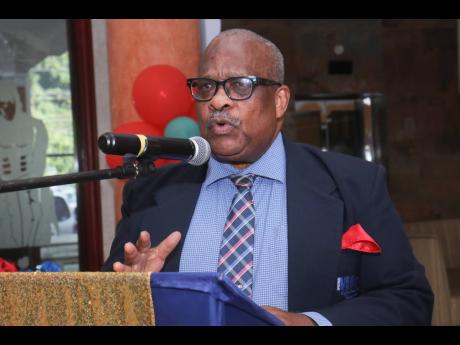We broke no law: IC
Calls made for amendment to Integrity Commission statute
The Integrity Commission (IC), the country's anti-corruption body, has defended its operating procedure on when reports are tabled in the Parliament to which it answers. This follows a severe backlash after it tabled a report alleging actions that may have amounted to a conflict of interest by the prime minister, with knowledge that no charge would be laid.
Yesterday the commission was forced to face an onslaught of criticism and issue a statement after allegations that it maliciously and deliberately sullied the name of Prime Minister Andrew Holness for his handling of matters during his tenure as education minister. The brunt of the vitriol has been levelled at the commission's executive director, Greg Christie. The commission, in defence of the process, said it broke no law when it filed the report to Parliament, as it is required by law.
However, a provision of the law which makes all the directors independent of each other is a source of concern for former parliamentarian, publisher and deputy speaker of the House of Representatives, Lloyd B. Smith.
Yesterday he turned the spotlight on legislators, urging them to quickly amend the law, to require both reports from the respective directors to be tabled in the parliament simultaneously.
“When I saw this conundrum developing, I did a little check and what I realise is that the entities operate like silos and it would appear as if part of their internal protocol is that neither the twin should meet. This would explain why there was no synchronicity in terms of both documents being released, one going to Parliament and the other immediately after,” he told The Gleaner yesterday.
In explaining internal protocols, the IC said the act makes the various directors independent of each other.
“The director of information and complaints receives complaints. He filters such complaints to the appropriate director, usually the director of investigation, who then conducts an investigation if he thinks it necessary. “After such investigation, he submits his report to the commission for tabling in Parliament. Where the director of investigation is of the view that the matter should be referred to the director of corruption prosecution, to determine whether or not prosecution should be instituted, the report is then forwarded to the director of corruption prosecution and, subsequently, to Parliament for tabling …” the commission's release stated.
Continuing it said: “The director of corruption prosecution, who is not subject to the direction or control of any person or body in relation to the conduct of prosecutions [section 34(3)], then decides whether or not, on the basis of the evidence contained in the report of the director of investigation, prosecution should be instituted. That decision is then sent to the commissioners.”
Smith said this must be changed.
“It is this requirement which has created all this, this, I don't even know what words to use. Clearly, the legislators need to look at the legislation, the standard operating procedure, so there is no further embarrassment of any public official. It must be changed with alacrity,” he stressed, noting that without urgent amendment the action of the commission, though lawful, could happen at the next sitting of the House, once a report is tabled.
And of the executive director, Greg Christie against whom the brunt of the vitriol is directed, he said “a standard operating procedure would determine that if Mr Christie operated lawfully within his terms of reference, then the calls for his removal should not be pursued”.
Smith said the former contractor general would have carried out his job “within the ambit of the law. So I think it is important that the law be amended swiftly”.
In defending its handling of the matter, the commissioners said: “There has been strict compliance with the law. Adverse comments in respect of the commission or its director of investigation are unwarranted and misconceived. The executive director of the commission has no control over the content of an investigation report or a ruling.
In its release the IC said, “Integrity Commission Act requires that where, in a report to the commission, the director of investigation is satisfied that there are reasonable grounds for suspecting that there has been a breach of a code of conduct by a public officer or parliamentarian, or where there is suspicion that an act of corruption or an offence under the act has been committed, the commission shall submit the report to Parliament for tabling,” said the commission.
It said there is no provision mandating the tabling of a ruling by the director of corruption prosecution, but notwithstanding the commission has taken the position that in the interest of full and early disclosure, the ruling must be communicated to Parliament, and the public advised. It stressed that where a report is sent to Parliament it “cannot be communicated to anyone before the report has been tabled”. The commission said it is so, by virtue of Section 53(3) of the Integrity Commission Act which states that “until the tabling of a report in Parliament, all matters under investigation by the director of investigation or any other person involved in such investigation shall be kept confidential and no report or public statement shall be made by the commission or any other person in relation to the initiation or conduct of (the) investigation”.
The Jamaica Civil Service Association (JCSA) said it is vindicated by its position that persons should not be named until charged.
In an interview, its president, O'Neil Grant, admitted that it was highly unlikely that Christie would not have followed the law.
“We have a problem with the legislation and some of the requirements. For example, when the report is tabled, it is tabled with persons' names, even though no charges are laid. We feel vindicated that our position that if the law does not require persons to be named, even if not charged in the filing to Parliament, you would not have this situation. If a person is referred to as person X or person Y, then you would not have this situation. They have to look at the law and fix that,” Grant told The Gleaner.
He was not in support of the gag clause being removed, but admitted that the current provision does not allow further clarification from the commission, by journalists, or anyone else, as to the recommendation of the director of corruption prosecution.
“… It is our considered opinion that Section 52(5) is irrelevant to the work of the investigator [because] if the accused individual was found by way of investigation to not be involved in any corrupt activity then there is no need to make any public declaration regarding culpability unless the matter was already public then such a declaration is necessary…” it highlighted in a release.
Meanwhile, a statement from government senators yesterday said the response issued by the commission did not put the matter to bed.
The senators are also asking for an explanation for the commission's silence after the report was tabled and prior to the delivery of the ruling when they had the legal authority to publicly correct the speculation and misinformation in the local and international media.
The senators said they wanted answers to the actions of the executive director on social media at a time “when he must have been aware of the exoneration…” and if the interest of the commission and all stakeholders is best served under the current leadership.
Further, the government lawmakers in the Upper House claimed that the “reputation and governance of the commission as an institution must be restored by immediate action which must include an investigation into the circumstances surrounding the actions” it outlined and “the resignation or other removal of the executive director”.
The Private Sector Organisation of Jamaica (PSOJ), in its release, said it was appalled by the disclosures shared in the media that failed to reveal the ruling by the director of corruption prosecution.
“The consequences of that egregious act has resulted in irreparable damage being occasioned to the office of the prime minister – the highest elected office in the country – by virtue of the public opprobrium which understandably resulted from the partial disclosure…” the PSOJ said.
Meanwhile, the People's National Party (PNP) which on Thursday called for the PM to step aside said yesterday that there is still cause for concern, despite the exoneration.
“…The director of corruption prosecutions has found that there was not enough evidence to mount a successful criminal prosecution; however, that is very different from exoneration. The narrative being promoted in some quarters that Andrew Holness has been exonerated by the decision not to prosecute is fundamentally misleading…” the party said.
It said the ruling of the director of corruption prosecutions does not change the content of the report of the director of investigation.


